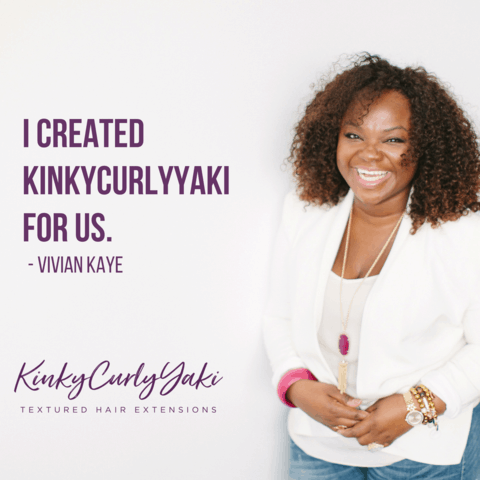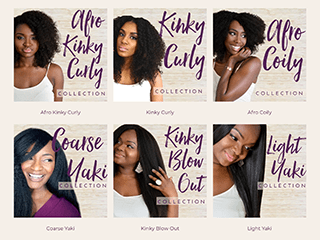Failure. That’s the key to success, according to Toronto-based Vivian Kaye, founder of KinkyCurlyYaki. “You fail. Okay, and . . . so what? That’s the first step to success,” says Kaye. She should know, she’s turned every challenge she’s faced in to remarkable opportunities.

Kaye was a 27-year-old corporate marketing coordinator when one of her three sisters decided to get married. Her sister hired a wedding decorator to manage everything from booking the church to buying the right flowers to choosing the perfect bridesmaid dresses. Two weeks before the wedding, the decorator demanded a lot more money which Kaye’s sister paid. Despite the additional funds, the decorator delivered a poor experience for Kaye’s family and their guests.
Having witnessed this experience firsthand, Kaye thought to herself, “this isn’t that hard, there must be a better way.” From there she worked relentlessly and built her own successful wedding décor business, Vivian Décor, specializing in diverse and ethnic weddings. The business thrived as Kaye excelled in designing everything from South Asian, to Italian, to Portuguese weddings. After seven years, she was making far more than her corporate career would’ve ever offered.
The idea for her second business, KinkyCurlyYaki, came from her need to look “presentable” for her job as a high-powered wedding decorator. Her Ghanaian heritage raised some challenges in the hair department. “In the professional world, there’s an acceptable way women should look,” says Kaye. “Especially for black women, that can be difficult. For the most part, people of African descent have hair that doesn’t grow out of their head straight. It’s textured, tightly coiled, curly hair.”
Ten years ago, black women who went to work in a natural afro were frowned upon. It just wasn’t acceptable in corporate life. “It was too much of a statement,” says Kaye.
She needed to find a professional-looking hair extension with a texture that was believable and authentic for her. But when she visited beauty supply stores, they tended to sell Brazilian, Malaysian, Chinese, or Indian weaves. “These were exotic textures that did not look as though they naturally grew out of my head,” she says.
“There’s this inside joke in the black hair world, where women go around with African hair in front and Indian in back.”
She decided she wanted to look as authentic as possible, protecting her hair while still wearing whatever style she wanted. “I sought out textures that looked kinky. I’d wear these wigs or weaves to meetings and women would ask me who my hairdresser was,” says Kaye. “I’d be like, ‘girl, it’s a weave!’ To which they all said, ‘that’s so awesome, I would totally buy that!’”
That’s when the idea struck. “All I was doing was emulating healthy, beautiful, natural-looking hair,” she says. “I didn’t want anyone asking where I bought it. I wanted people to ask me what my beauty regimen was.”
With an already successful wedding business, Kaye needed to weigh her options carefully. “I wasn’t interested in letting that go,” she says. As it turned out, there were no companies at the time that focused on selling kinky hair. And those that did sell it would bury it under other products.
Thus, in December 2012—during an off-season for her wedding business—Kaye created a logo, built a website, and waited eagerly to see what would happen.
The new business exploded. Using her profits from Vivian Décor, Kaye funded the rapid growth of KinkyCurlyYaki. “It just grew. I had accidentally tapped into what was the beginning of influencer marketing,” she says. “Because I was a connoisseur of hair, I was already active in Facebook black-hair groups and forums. So, I sent bundles to a few girls I knew who wore kinky textures and asked them for their opinions.”
Lo and behold, they went out and produced videos and posted pictures everywhere. Kaye’s business was growing through what is now called “social proof”. Since this was pre-Instagram, news of Kaye’s business spread almost entirely on Facebook.
Fraudsters Come Calling
Soon after the growth, online fraud caught up with KinkyCurlyYaki. At first, Kaye solely used PayPal to accept online payments, which meant she had to wait until funds were confirmed before shipping products. While secure, this practice delayed when customers could get their orders. So as soon as volume warranted it, she began accepting credit cards. Like clockwork, the fraudsters showed up immediately.
“As soon as we started taking credit cards, it opened us up to a whole new demographic of fraud,” she says. As it turned out, hair extensions, because of the value of the product, are very attractive targets.
“We were starting to get more and more chargebacks that we couldn’t fight,” says Kaye. “We also were reluctant to lose business. So someone in the Netherlands says they want to buy hair. Well, it’s a $500 order. I don’t want to pass that up, so we’d send it to them and hope for the best.”
Sometimes her trust was rewarded, sometimes not. So what was Kaye doing about the cost when she was defrauded? “We were eating it,” she says. “Just eating it. We would try and fight as much as possible, but it just got to the point when we gave up.”
False Positives Hurt Revenues
Kaye would attempt to discern suspicious orders from such things as the names and email addresses, or if a new customer was ordering a large volume of hair all at once. And of course, she began refusing to ship to exotic places. As it turned out, she lost a lot of business that way, because a lot of her best customers were in the military. “We didn’t realize why we’d get so many orders from Guam, so we just refused them all,” she says.
Then Kaye heard about Signifyd. “At first, I was like, ‘oh man, what if this doesn’t work?’ because Signifyd isn’t cheap,” she says. But then on Black Friday 2016 she started submitting suspicious transactions to Signifyd. And Kaye found that she liked not having to worry as the orders poured in. “I liked that I could hand off that piece of my of business and say, ‘Okay, I can ship these orders with confidence.’”
Growth since then has been “phenomenal,” Kaye says. “In 2016, we broke through a million dollars in sales. With Signifyd’s help, we could keep many more of our transactions, as opposed to running off gut feel and declining transactions that were perfectly legit.” KinkyCurlyYaki has continued to grow and Kaye expects 2018 to be another record year.
Kaye ranks Signifyd as one of her favorite business tools because she knows that even if a payment does bounce, she’s not going to have to fight to get her money back, since Signifyd provides a financial guarantee against ecommerce fraud and chargebacks. “I love it. It’s such an easy platform to use. I don’t think I could’ve become this big without Signifyd,”
Kaye offers the following advice to would-be entrepreneurs: Try it. So what if you fail at first. “Everyone who starts a business, if they don’t fail, then how do they get better? How do they learn? How do they grow?” she asks. “Just take the initiative and do it. What’s the worst that could happen?”









